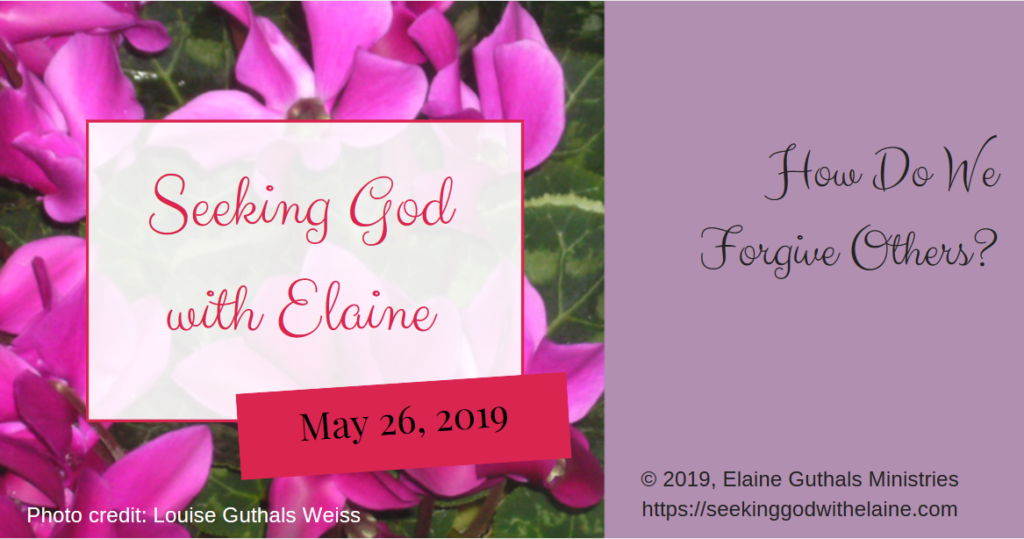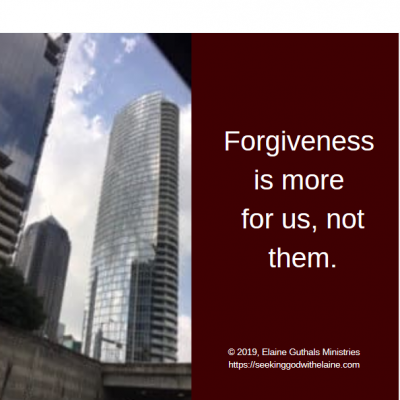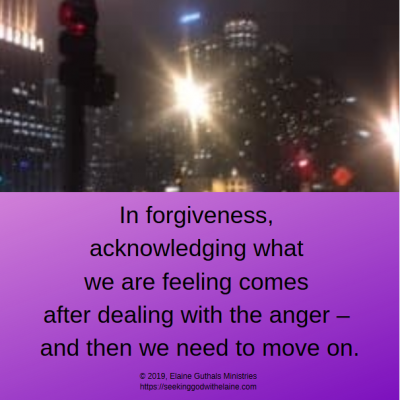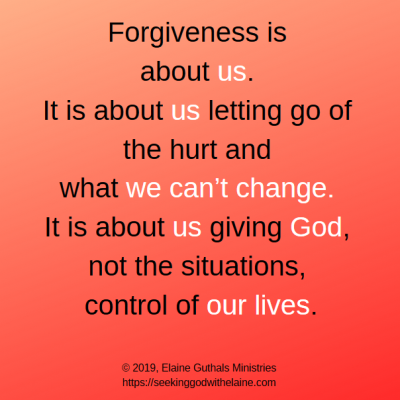Forgive our sins, as we forgive everyone who has done wrong to us.
Luke 11:4 (CEV)
Scripture: Matthew 5: 43-48
Forgiving someone is hard. Our spouses, family, or friends may have done something that hurt us and requires our forgiveness. This devotion explores a process we can take to forgive others.
To read devotions in the When We’ve Been Wronged series, click the buttons below.
Cliff Notes
- The issues are not whether we will hurt those we love; they should be whether we do it intentionally or not and whether it is unresolved.
- Forgiveness is more for us, not them.
- We have to deal with our anger first.
- Acknowledging what we are feeling comes next – and then we need to move on.
- Forgiveness should have an element of forgetfulness to it.
- It probably isn’t going to be a quick fix, not a one-and-done type of thing.

We all will hurt those we love because we are human. The issues should be whether we do it intentionally or not and whether it is unresolved.
Luke 17: 4 says we must forgive those who ask for forgiveness – even multiple times. It is easy to forgive those who are trying their best to do right and are truly contrite when they realize they have wronged us. It is harder to forgive people when it seems like we are continually – purposefully – being wronged.
It is especially hard to give forgiveness if the relationship is toxic. A toxic relationship has some kind of physical or emotional abuse as a component.
But relationships don’t need to be toxic to have one partner break a relationship in some significant way. Whatever the situation, God expects us to forgive them.
What Is Forgiveness?
Forgiveness is when we give up the bitterness and resentment that we feel because we have been wronged. It is a conscious decision to not seek vengeance.
Read that again. It is talking about us, not them. Forgiveness is more for us, not them.

It is not saying that we are condoning their actions. It doesn’t say the forgiveness has to be justified. Forgiveness is not going to turn our feelings and emotions off like a faucet or wipe our memories of the incident.
It is not even saying that the relationship will magically be restored. We might decide that we no longer want to have contact with them, and that is okay. We may decide to not tell them we have forgiven them, and that is okay, too.
It is saying that it is a conscious decision. We control whether we give forgiveness or not – yes, even in situations where we feel we have no control.
That is what my research into this topic said. What does God say?
God says that forgiveness has a reason. It is so we can be blessed (Mt. 5: 7).
Matthew 5: 43-45 says, “You have heard that it was said, ‘You shall love your neighbor and hate your enemy.’ But I say to you, love your enemies, do good to those who hate you, and pray for those who spitefully use you and persecute you, that you may be sons of Your Father in heaven …” (NKJV).
The most common argument for believers to forgive others is that God first forgave us. Matthew 5: 14-15 says, “If you forgive others the wrongs they have done to you, your Father in heaven will also forgive you. But if you don’t forgive others, your Father will not forgive you the wrong you have done” (GNT).
When we don’t forgive someone that damages our relationship with God. We have to be right with man before we can be right with God (Mk. 11: 25-26).
Not forgiving someone has consequences of its own. Matthew 18: 35 says, “So My heavenly Father will also do to you if each of you does not forgive his brother from his heart” (HCSB). Ouch!
Bitterness can come out of not forgiving someone. Unfortunately, a lot of times the person doesn’t care if we have forgiven them or not. It is just eating at us.
So, What Do We Do to Forgive Someone?
It is easy to say the words, “You’re forgiven.” But how do we actually do that? From the definition above, it is a conscious choice.
We have to deal with our anger first. Ephesians 4: 26 says, “Be angry and do not sin. Don’t let the sun go down on your anger” (HCSB).
While anger itself is okay, we have to stop letting it control our lives. Uncontrolled anger is not good for us – mentally or physically. Healing is not going to start to begin until we process the situation and turn the corner toward living the way in which God wants.
Acknowledging what we are feeling comes next – and then we need to move on. We have to be honest with ourselves, but rehashing the past doesn’t help us. True, this may seem beyond our control as the person may still be doing a variation of the same theme.

Forgiveness should have an element of forgetfulness to it. That doesn’t mean you have to put yourself back in the situation. It means that you shouldn’t harp on it. Get over it. Put it to bed. Move on.
We have to watch to see if we are making ourselves the victim. Yes, we can be the victim, but we may not always be. We have to take a good, honest look at the situation. What transpired and why?
What is stopping us from forgiving? What changes do we need to make to diffuse the anger? What can we use as a substitute to divert our attention when the anger starts to build? How are we fanning the resentments, and how can we get past that? How can we avoid the situations that feeds the anger?
I don’t know about you, but I do a lot of conversations in my head. We may need to corral some of our thoughts. They can be used to make something an even bigger deal than it is. They can also flip the situation so that we are not taking responsibility for our actions.
To read How Can We Corral Our Thoughts?, click the button below.
We need to focus on God and us. Why did this trigger this much of a response from us? What does God want the takeaway from this experience to be? How can we use what we’ve learned to help others?
One of the hard parts is trying not to judge the other. A lot of times this stems from our hurt. It can be where we lash out. What God wants us to do is love this person.
How Do We Apply This?
Some may find it helpful to write down their thoughts and feelings. Journaling or writing a letter you may or may not send can be a private way to get it all out. We can acknowledge when things are really getting us down while taking a good look at how things really are.
We can use the conversations in our heads to be able to “say” to the person what we never would be able to say in reality for various reasons. If it were real, the situation might escalate because the other may try to press our buttons – and we know how most of us try to avoid confrontations!
Or we may have trouble getting everything out if we were really talking with the person. Sometimes, when things mean the most to us, it is more difficult to have the needed discussions. Hopefully, we can have the discussions with ourselves while taking all the emotion out.
We can talk it out with a trusted friend or a professional. We may just need to say everything out loud. There is nothing wrong with going to a professional to work through things. They may be able to bring up things we hadn’t thought about.
Remember, though, forgiveness can’t be forced. It has to be genuine. It must be our desire to forgive those who have wronged us.
It probably isn’t going to be a quick fix, not a one-and-done type of thing. It is going to take us time to process and work through it. Plus, we may have to do the process several times.
We won’t have necessarily failed when the hurt feelings comes back. We may not be letting God have full control of the situation. We like to try to clean ourselves up, but only God can do that (Jer. 2: 22). But God may just be still growing us.
Also, it could be Satan trying to trip us up again and trying to get us farther from God. We just have to say, “I am not listening to you today, Satan.”
We also have to remember that we are probably not going to be able to change the person. That is up to them. They are in charge of themselves. We only work on ourselves.
Back to the definition. Forgiveness is about us. It is about us letting go of the hurt and what we can’t change. It is about us giving God, not the situations, control of our lives.

Well, I’ve given myself a lot of food for thought over these four devotions. Excuse me while I go spin my gears to process all of this. It isn’t going to be easy for me. I just hope I make substantial strides. I know this isn’t going to be over and done because, hey, it is what it is.
Loving Father. You ask us to show love to others by forgiving them. When the pain cuts too deeply, Lord, that is hard. Help us to be more like You and love others enough to forgive them. Amen.
Related Links
On researching how to forgive others for this devotion, I came across these these resources, which I used as the foundation for my devotion.
Brandt, A. (2016). How do you forgive even when it feels impossible? (Part 2). Retrieved May 24, 2019, from https://www.psychologytoday.com/us/blog/mindful-anger/201605/how-do-you-forgive-even-when-it-feels-impossible-part-2
Greater Good Magazine. (n.d.) What is forgiveness? Retrieved May 24, 2019, from https://greatergood.berkeley.edu/topic/forgiveness/definition#what-is-forgiveness
Greater Good Magazine. (n.d.) Why practice it? Retrieved May 24, 2019, from https://greatergood.berkeley.edu/topic/forgiveness/definition#why-practice-forgiveness
Greater Good Magazine. (n.d.) How do I cultivate it? Retrieved May 24, 2019, fromhttps://greatergood.berkeley.edu/topic/forgiveness/definition#how-cultivate-forgiveness
Hey Sigmund. (n.d.). 15 Signs of a Toxic Relationship. Retrieved May 24, 2019, from https://www.heysigmund.com/toxic-relationship-15-signs/
O’Shoney, C. (n.d.). How to forgive someone who has hurt you (including yourself). Retrieved May 24, 2019, from https://www.melyssagriffin.com/forgive-someone/
Pushing Beauty. (n.d.) Forgiveness: 7 steps to healing after someone’s hurt you. Retrieved May 24, 2019, from https://www.pushingbeauty.com/articles/2016/4/28/how-to-forgive-someone-whos-hurt-you
What do you think? What else can we do to make sure forgiveness is more than words? Leave me a comment below (about this or anything else) or head over to my Facebook group for some interactive discussion.
If you have not signed up for the email daily or weekly providing the link to the devotions and the newsletter, do so below.
If God has used this devotion to speak with you, consider sharing it on social media.
Pingback: How Did Peter and Paul Settle Their Conflict? – Seeking God with Elaine